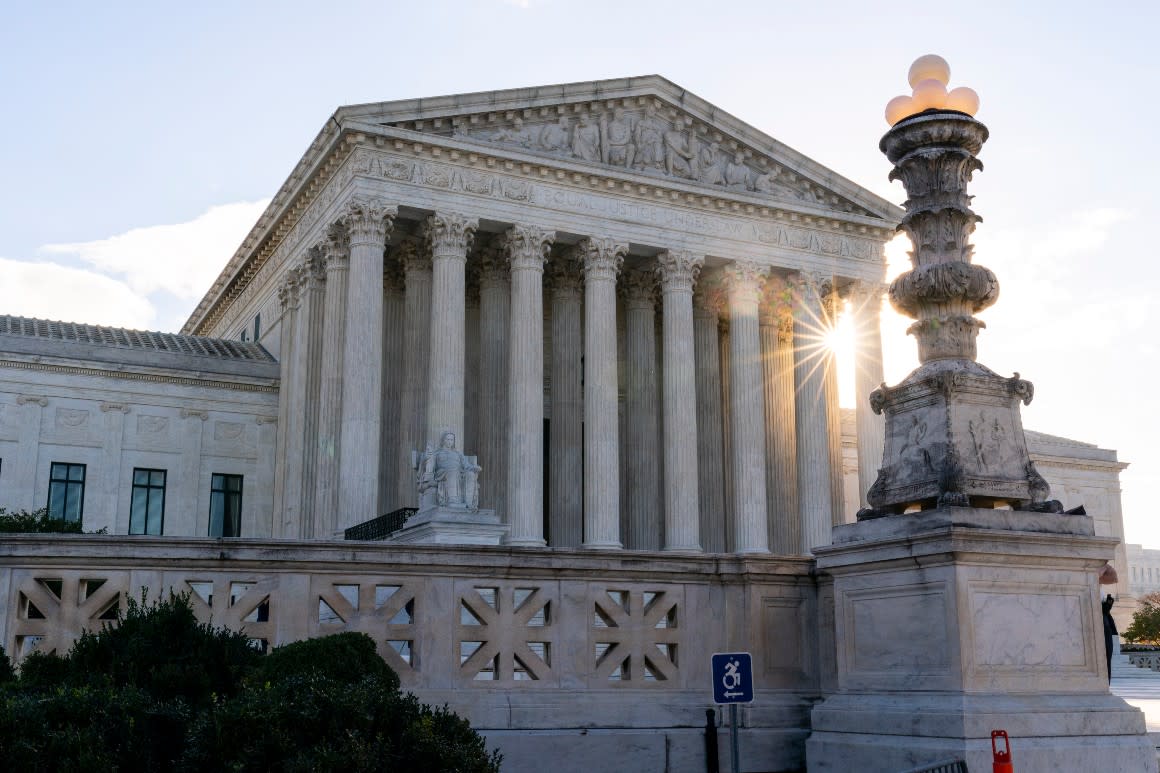Supreme Court appears wary of striking down Obamacare

The Supreme Court on Tuesday signaled it’s unlikely to tear down Obamacare over a Republican-backed lawsuit challenging the landmark health care law.
The justices’ lines of questioning during a two-hour-long argument session suggest at least two members of the court’s newly fortified six-justice conservative majority have reservations about overturning or undercutting a law that covers more than 20 million people and provides popular insurance protections.
This latest case, which is the third major challenge to the law heard by the court and comes amid the worst pandemic in a century, centers around Congress’ decision in 2017 to eliminate the law’s penalty for not having health insurance — without removing the coverage requirement itself. A group of Republican states led by Texas and supported by the Trump administration argued that move made the so-called individual mandate unconstitutional, so the rest of the law should fall.
Chief Justice John Roberts and Trump appointee Justice Brett Kavanaugh strongly questioned whether the elimination of the mandate penalty made the rest of the law invalid. Kavanaugh appeared to signal on several occasions that he favored leaving the rest of the law intact if the mandate is struck.
“I tend to agree with you that it is a very straightforward case under our precedents, meaning that we would excise the mandate and leave the rest in place,” Kavanaugh said.
Roberts, who authored the two previous opinions upholding aspects of Obamacare, said the court should consider whether Congress in 2017 intended for the rest of the law to survive if the mandate was found unconstitutional.
“Here Congress left the law intact when it lowered the penalties to zero,” Roberts said. “That seems to be compelling evidence on the question.”
Oral arguments are not a perfect indicator of how the justices may eventually rule, but the remote session, conducted by telephone due to the pandemic, may provide some reassurance to people depending on Obamacare, a $3.6 trillion health care industry that’s been remade by it, and policymakers across Washington.
Even Justice Samuel Alito, a George W. Bush appointee with a reliably conservative vote, sounded doubtful that the court could say the mandate is now “essential” to keep the ACA functioning, as Obamacare’s defenders had argued during the first Supreme Court challenge to the law in 2012.
“At the time of the first case there was strong reason to believe that the individual mandate was like a part of an airplane that was essential to keeping the airplane flying,” Alito said. “But now the part has been taken out and the plane has not crashed.”
A ruling against the law, officially known as the Affordable Care Act, could derail President-elect Joe Biden’s plans to build on its coverage and might preoccupy or even overwhelm the new Congress. Democratic lawmakers as well as many of their Republican colleagues have been dreading a scenario in which a Supreme Court decision forces them to make a quick legislative fix, given the persisting bitter partisanship over the law. Given past patterns, the justices might rule by February, although if their back-and-forth argument over the case gets heated, a decision may not emerge until June or July, just before the court’s summer break.
Many legal observers believed this case, California v. Texas, to be the weakest of the Supreme Court challenges to Obamacare so far. But the law appeared to be in greater danger after Amy Coney Barrett, Trump’s newest appointee, was quickly installed following the September death of Justice Ruth Bader Ginsburg, who almost certainly would have been a reliable vote for Obamacare.
Under the most likely scenario to allow Obamacare to survive unscathed, at least two Republican appointees would need to join the court’s three liberal justices.
During the arguments, which stretched beyond the scheduled 80 minutes to two hours, several justices — including Barrett — devoted most of their questions to a legal technicality. That is whether Congress’ decision to leave the now-toothless mandate in place actually hurt the red states, along with the two individual plaintiffs named in the case, enough to justify their lawsuit against the U.S. government agencies overseeing the law. If not, they would not have the legal standing to bring the case, dooming the lawsuit.
Barrett suggested that the plaintiffs’ complaint may not lie with the federal agencies they are suing, but with the lawmakers who changed Obamacare.
“Doesn’t it seem that Congress is the one who injured the individual plaintiffs?” Barrett said. “You cannot sue Congress.”
Conservative judges tend to want plaintiffs to meet fairly tough standards before they can bring a case, although the Republican-appointed judges in lower courts who sided with Obamacare’s challengers have mostly shrugged off questions about standing.
If the justices find the plaintiffs have standing, then the case likely hinges on a legal concept known as severability. The red-state coalition challenging the law filed a lawsuit in 2018 arguing that an individual mandate without a penalty is now unconstitutional, since the Supreme Court previously upheld the coverage requirement as a valid exercise of congressional taxing power. And they contended that since the mandate was seen as central to the insurance markets’ functioning, the rest of Obamacare must also go.
After the Trump administration refused to defend the law, a group of blue states led by California and later joined by the Democratic House of Representatives took up the charge. They note that the law's insurance marketplaces have remained stable even after the individual mandate was rendered toothless.
Roberts seemed skeptical that the challengers had a sound rationale for their demand to bring down the whole statute. He said the complaint essentially was a backdoor way of targeting a sweeping law by latching onto one provision.
The lawsuit, he suggested, may amount to “letting someone not injured by the provision that needs challenging to roam around to 1,000 pages [of a law] and pick up whatever ones he wants to attack.”
